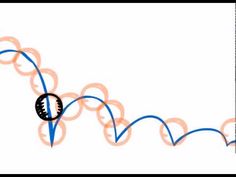- What distinguishes convergent sequences from divergent sequences
It is known that a sequence is a collection of numbers arranged in a specific way where there is a first element with or without a last element. There are two types of sequences: the ones that converge and the ones that diverge. We know that a sequence converges when it tends to only one value and it diverges when it doesn’t. This concept can be observed in the real world when, for example, we see a bouncing ball. Let’s observe only the maximum high the ball reaches in every rebound. We notice that the height is being reduced every moment the ball bounces. So each value of the height is decreasing in an ordered way and we can say that these values have a limit because there will be a moment when the height is zero. So this a sequence that converges to one number. But what if we think about the first cell in the world. We are not even sure about its form or size but we know it needed to reproduce itself in order to create a new living being and the new living being needed to reproduce itself again, so the chain never ended giving as a result a variety of animals, plants and other living things. Surprisingly, this chain will never have an end because living beings will continue reproducing. In conclusion, we can notice that the number of living things continue growing to infinity, so we say the sequence is divergent.

Convergent Sequence

Divergent sequence
2. what distinguishes convergent series from divergent series.
It is known that a series is the sum of the elements o a sequence. Series can have a divergent behaviour when its partial sums do not have a limit or a convergent behaviour when its partial sums have a limit.
In order to understand series in a better way, you can imagine that you have a rich godfather who tell you that he is going to give you money every day. So the next day, he gives 50 dollars to you, the next day 25 dollars, the next day 12.5 dollars, the next day 6.75 and so on. Your godfather is so generous that he promises to give money not only to you but also to your next generations in the same order as he was giving money to you. The question is: do you think you will be rich? Will your grandchildren be rich? The answer depends on whether the series converge or diverge. If you say that the series diverge, then you will be rich. However if you say the series converge, you will only reach a limit of 100 hundred dollars.